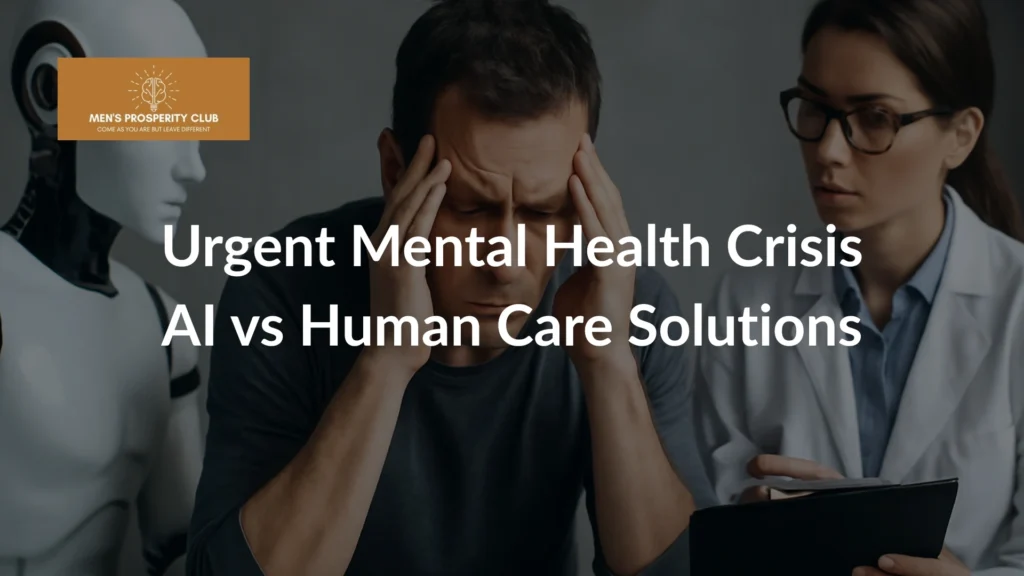The UK is currently facing an escalating mental health crisis, with rising demand for services, long waiting times, and the growing reliance on artificial intelligence (AI) as a temporary solution. This crisis, which worsened after the COVID-19 pandemic, lockdowns, and the ongoing cost-of-living crisis, is placing immense pressure on an already overburdened healthcare system. Despite a significant government investment of £11.31 billion in mental health services for 2023/24, it is clear that this is insufficient to address the deepening mental health crisis effectively.
Amidst these challenges, AI is being tested as a potential stopgap to help manage mental health care, particularly in response to the long waiting times many individuals face. While AI offers some promising benefits, concerns are growing about its ability to deal with the complexities of human mental health. In this article, we explore the urgent need for human care, the role of AI in the mental health sector, the risks of replacing human professionals with machines, and the critical support provided by mental health support groups like Men’s Prosperity Club, as well as the mental health benefits of green spaces and walk-and-talk therapy.
Understanding the Mental Health Crisis in the UK
The mental health crisis in the UK is undeniable. New NHS figures reveal that over 3.7 million people sought mental health support in 2023/24, compared to 2.7 million in 2018/19. The demand for mental health services has grown exponentially, resulting in increased pressure on healthcare professionals. Waiting times for mental health appointments are now as long as two years in some areas, with many individuals’ mental health deteriorating further as they wait for care.
Conditions like anxiety, depression, and eating disorders are becoming more widespread, exacerbated by factors such as the fast-paced nature of modern life, excessive use of technology, and the long-term effects of the COVID-19 pandemic. Among the younger population, mental health issues are particularly prevalent. According to Ofcom, nearly half of adolescents are online “almost constantly,” and 97% of children have a smartphone by the age of 12. This constant exposure to social media and digital platforms can heighten feelings of isolation and anxiety, contributing to the worsening mental health crisis.

Men’s Mental Health Issues: A Growing Concern
While mental health struggles affect individuals of all genders, the challenges faced by men are often overlooked or underreported. Cultural expectations around masculinity often make it more difficult for men to acknowledge their mental health issues or seek help. Men are generally less likely than women to talk about their mental health, and many are reluctant to open up due to the fear of being perceived as vulnerable or “weak.”
This reluctance to seek help has dire consequences. Suicide rates among men are significantly higher than among women, with men being three times more likely to die by suicide. The highest suicide rates are observed in men aged 45-49, underscoring the urgent need for targeted interventions and support systems tailored to the unique challenges men face in terms of mental health.
Additionally, many men grapple with mental health struggles related to their roles as providers, partners, and fathers. The societal pressures to maintain a successful career, provide for their families, and meet expectations of strength and stability can lead to feelings of inadequacy, stress, and emotional isolation. Unfortunately, these issues are often compounded by a lack of awareness about how to express emotions or access the help they need.
The Role of AI in Mental Health: A Quick Fix?
In response to the overwhelming demand for mental health services, AI is increasingly being integrated into the NHS’s approach to care. Various NHS trusts are piloting AI apps, known as Digital Mental Health Interventions (DMHIs), designed to support individuals while they await professional treatment. Some trials have shown positive outcomes, with AI chatbots helping to reduce symptoms of anxiety and depression. However, the long-term effectiveness of AI as a substitute for human care remains uncertain.
The primary advantage of AI in mental health care lies in its ability to provide immediate support. AI-driven apps are available 24/7, offering individuals the chance to manage their emotions, practice coping strategies and monitor their mental health progress. This can be particularly valuable for those who face long waiting lists or lack access to traditional therapy due to geographical or financial constraints.
However, the limitations of AI become apparent when considering the complex and nuanced nature of human mental health. AI chatbots are programmed to provide generic advice based on predefined algorithms. While they can offer basic guidance, they lack the ability to adapt to an individual’s unique needs or respond to the emotional subtleties that are central to effective therapy. The absence of empathy, nuance, and the ability to interpret body language means that AI cannot replace the vital human connection that forms the foundation of successful therapy.

AI’s Potential Benefits: Efficiency and Accessibility
Despite its limitations, AI can still play a valuable role in improving the efficiency and accessibility of mental health care. One of its key benefits is its ability to streamline administrative tasks, such as triaging cases, managing patient data, and sending automated reminders for appointments. By automating these processes, healthcare professionals can focus more on providing direct, human-centred care, rather than being overwhelmed by administrative burdens.
AI also improves accessibility to mental health care, especially for individuals in underserved or remote areas. AI-driven mental health apps offer an alternative for people who may not have easy access to traditional therapy services. These apps also provide an affordable solution for individuals who may struggle to access professional care due to cost.
When used alongside traditional therapy, AI can serve as a supportive tool to help individuals manage their mental health in real-time. It can provide temporary relief while patients await more personalised care, helping to alleviate some of the pressure on mental health services.
The Risks of Replacing Human Therapists with AI
While AI can play a supplementary role in mental health care, relying too heavily on technology to treat vulnerable individuals poses significant risks. One of the most pressing concerns is that AI lacks the essential human touch. Therapy is not just about offering advice; it is about building a trusting relationship, offering empathy, and understanding the unique needs of each individual. AI cannot replicate these qualities, which are integral to the therapeutic process.
Additionally, AI therapists lack the ability to respond to emotional cues, such as body language, tone of voice, or facial expressions. This makes it difficult for AI to address complex mental health issues effectively. A human therapist, on the other hand, can provide personalised insights, ask probing questions, and adjust their approach based on the individual’s progress.
Another significant concern is data privacy. Many AI-powered mental health apps collect sensitive personal information, including mood patterns and emotional states. This data may be vulnerable to hacking or misuse, raising serious security and privacy concerns for users.

The Need for More Human Care in the Mental Health Crisis
Despite the potential benefits of AI, it is evident that human care remains indispensable in addressing the mental health crisis. Mental health professionals possess the expertise to provide tailored, compassionate care that addresses the unique needs of each individual. AI, though useful in certain contexts, cannot replace the human connection that is essential for effective therapy.
The government’s current investment in mental health services, while helpful, is insufficient to meet the growing demand for care. There is a need for greater recruitment of mental health professionals, particularly mental health nurses, who play a vital role in delivering direct care. Offering competitive salaries and improving working conditions is crucial to ensuring that mental health professionals remain in the workforce and can meet the rising demand for care.
Increased investment in training and supporting existing professionals is also necessary. As the mental health landscape evolves, professionals must be equipped with the skills and tools to navigate the challenges of modern care, including the integration of AI.
The Human Element in Therapy
Human therapists bring something that AI simply cannot replicate: the ability to build meaningful, therapeutic connections with their patients. Whether through face-to-face sessions or online therapy, human therapists can listen actively, build rapport and offer personalised insights that help individuals navigate their mental health journey.
Moreover, therapists are trained to handle a wide range of mental health conditions. They can adjust their approach based on the individual’s needs and progress, ensuring that the therapy is effective. In contrast, AI follows a one-size-fits-all approach, which may not be appropriate for everyone, especially those with complex or severe mental health issues.
The Role of Mental Health Support Groups: Men’s Prosperity Club
In addition to professional therapy, mental health support groups are a crucial element in addressing the mental health crisis. Organisations like Men’s Prosperity Club provide a safe, non-judgmental space for men to share their struggles, connect with others facing similar challenges and seek guidance and support.
Support groups are particularly beneficial for men, who may feel societal pressure to suppress their emotions. Men’s Prosperity Club helps foster a sense of community and belonging, allowing men to address mental health issues in a supportive, proactive environment.
Benefits of joining a mental health support group include:
- Shared Experiences: Hearing others’ stories helps individuals feel understood and less isolated.
- Mutual Support: Members provide emotional and practical support, encouraging each other through shared experiences.
- Stress Relief: Talking openly about mental health issues can help reduce stress and improve emotional resilience.
- Empowerment: Support groups empower men to take control of their mental health and make positive changes.

Support groups like Men’s Prosperity Club provide a vital lifeline for individuals struggling with mental health, helping to bridge the gap while they await professional care.
The Walk and Talk Benefits: Healing Through Movement
Walk and talk therapy is a powerful approach that combines physical activity with therapeutic conversation. This method provides numerous mental health benefits, including:
- Improved Mood: Walking boosts endorphin levels, which help alleviate symptoms of depression and anxiety.
- Relaxed Environment: Walking outdoors provides a more relaxed setting compared to the traditional therapy room, making it easier for individuals to open up.
- Reduced Anxiety: Physical movement can help ease anxiety, making it easier to engage in meaningful conversations.
- Connection with Nature: Spending time outdoors, particularly in green spaces, promotes relaxation and enhances mental well-being.
The Healing Power of Green Spaces
Green spaces—parks, gardens and natural reserves—are invaluable in supporting mental health. Research shows that time spent in nature can reduce stress, improve mood and lower levels of anxiety and depression. Green spaces offer a calming environment that helps individuals reconnect with nature, fostering mental and emotional healing.
Incorporating green spaces into therapy sessions, such as combining walk and talk therapy with time in nature, can amplify the benefits of both. The calming effects of nature, coupled with physical movement and therapeutic conversation, create a holistic approach to improving mental health.

Conclusion: A Balanced Approach to Mental Health Care
While AI can play a valuable role in streamlining administrative tasks and improving accessibility to mental health care, it cannot replace the human connection that is essential for effective therapy. The mental health crisis in the UK requires a comprehensive approach that integrates both technology and human care. AI should complement traditional therapy, not replace it.
To effectively address the mental health crisis, the government and healthcare providers must invest in recruiting and supporting mental health professionals, while also integrating AI in a way that enhances, rather than substitutes, human care. Support groups like Men’s Prosperity Club, innovative approaches like walk and talk therapy, and the healing benefits of green spaces all play crucial roles in providing individuals with the tools and support they need for lasting mental health recovery.
It’s time to take action to address this urgent issue and build a more compassionate, human-centred mental health care system.




